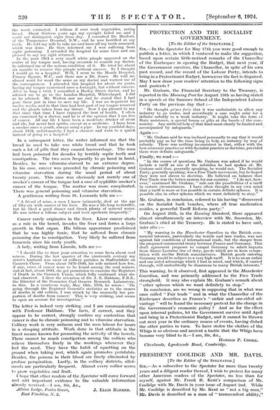PROTECTION AND THE SOCIALIST GOVERNMENT.
[To the Editor of the SPECTATOR.] SIR,—In the Spectator for May 17th you were good enough to publish a letter, in which I ventured to make the suggestion,
based upon certain little-noticed remarks of the Chancellor of the Exchequer in opening the Budget, that next year, if the Government survives, the Chancellor, in spite of his own past record, and the record of the Labour Party, intends to bring in a Protectionist Budget, howsoever the fact is disguised. May I now draw your readers' attention to the following signs and portents ? •
Mr. Graham, the Financial Secretary to the Treasury, is reported in the Morning Post for August 19th as having stated
in a speech at the Summer School of the Independent Labour Party on the previous day that :-
" He thought prima fade that it was undesirable to allow any industry to go under, and accordingly a case might arise for a definite subsidy to a weak industry. It might take the form d State assistance, a special bonus or gifts at the hands of the com- munity. Any artificial help of that kind must clearly be limited and accompanied by safeguards."
Again :— " Mr. Graham said he was inclined personally to say that it would probably pay us for the time being to help an industry by way of subsidy. There was nothing inconsistent in that, either with the best economic practice or with Socialist practice or doctrine, provided there were definite safeguards."
Finally, we read :— " In the course of questions Mr. Graham was asked if he would include a tariff as one of the subsidies he had spoken of. Mr. Graham said that, generally speaking, he would not. The Socialist Party, generally speaking, was a Free Trade movement, but he hoped they were not slaves to doctrine. -He believed on balance that Free Trade was the better system for our country. " I do not, how- ever," continued Mr. Graham, " rule out the possibilities of a tariff in certain circumstances. I have often thought in my own mind that a tariff is more or less possible in certain definite spheres. It is possible also in other spheres which we want definitely to stop."
Mr. Graham, in conclusion, referred to his having "discovered on the Socialist back benches, where all true moderation resides, a powerful Tariff Reform party."
On August 20th, in the Evening Standard, there appeared almost simultaneously an interview with Mr. Snowden, Mr.
Graham's chief at the Treasury. He is stated to have said, inter alia :—
" My warning in the Manchester Guardian to the British com- mercial interests, particularly the textile and iron trades, was not against fair conditions of international trade, but the danger from the proposed commercial treaty between France and Germany. This draft agreement proposes to compel Germany to admit imports from Alsace-Lorraine free of duty, goods which are in keen compe- tition with similar British manufactures. British goods entering Germany would be subject to a very high tariff. It is to us an unfair and one-sided advantage which I had in mind, and which, if carried through, will undoubtedly be disastrous to many British interests."
This warning, be it observed, first appeared in the Manchester Guardian, and was primarily addressed to the Free Trade stronghold. It may also explain Mr. Graham's remark about other spheres which we want definitely to stop."
In conclusion, are we wrong in supposing that in what was once called " Fair trade " and in what the Chancellor of the Exchequer describes as France's "unfair and one-sided ad- vantage " will be found the necessary pretext for the change in the Government's economic policy ? And as for the effect upon internal policies, let the Government survive until April and bring in a Protectionist Budget, and it cannot be thrown out next year in the ordinary course of events, having dished the other parties in turn. To have stolen the clothes of the Whigs is so obvious and ancient a tactic that the Whigs have become very blind to it —I am, Sir, &c.,
HAROLD P. COOKE.
Clevelands, Lyndezcode Road, Cambridge.






































 Previous page
Previous page